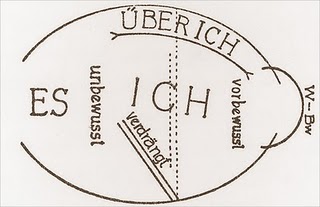Freud on communism
 Years ago I made available to my students--and then through the web to the world (this page is one of the most frequently visited pages in any of my web sites)--Freud's comments on political theory and political life in Civilization and Its Discontents. Here is a link to the excerpt, and here is his paragraph on communism:
Years ago I made available to my students--and then through the web to the world (this page is one of the most frequently visited pages in any of my web sites)--Freud's comments on political theory and political life in Civilization and Its Discontents. Here is a link to the excerpt, and here is his paragraph on communism:
The Communists believe they have found a way of delivering us from this evil. Man is wholeheartedly good and friendly to his neighbour, they say, but the system of private property has corrupted his nature. The possession of private property gives power to the individual and thence the temptation arises to ill-treat his neighbour; the man who is excluded from the possession of property is obliged to rebel in hostility against the oppressor. If private property were abolished, all valuables held in common and all allowed to share in the enjoyment of them, ill-will and enmity would disappear from among men. Since all needs would be satisfied, none would have any reason to regard another as an enemy; all would willingly undertake the work which is necessary. I have no concern with any economic criticisms of the communistic system; I cannot enquire into whether the abolition of private property is advantageous and expedient. But I am able to recognize that psychologically it is rounded on an untenable illusion. By abolishing private property one deprives the human love of aggression of one of its instruments, a strong one undoubtedly, but assuredly not the strongest. It in no way alters the individual differences in power and influence which are turned by aggressiveness to its own use, nor does it change the nature of the instinct in any way. This instinct did not arise as the result of property; it reigned almost supreme in primitive times when possessions were still extremely scanty; it shows itself already in the nursery when possessions have hardly grown out of their original anal shape; it is at the bottom of all the relations of affection and love between human beings--possibly with the single exception of that of a mother to her male child. Suppose that personal rights to material goods are done away with, there still remain prerogatives in sexual relationships, which must arouse the strongest rancour and most violent enmity among men and women who are otherwise equal. Let us suppose this were also to be removed by instituting complete liberty in sexual life, so that the family, the germ-cell of culture, ceased to exist; one could not, it is true, foresee the new paths on which cultural development might then proceed, but one thing one would be bound to expect, and that is that the ineffaceable feature of human nature would follow wherever it led.